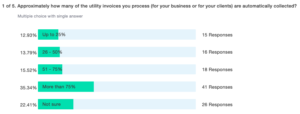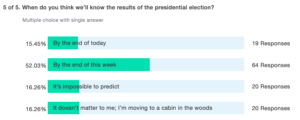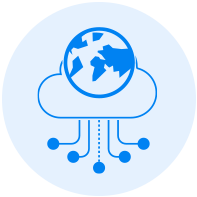
SPARK Insights: Industry Leaders Handle Today’s Challenges with Automated Processes
Honor Donnie | November 17, 2020 | AP Automation | Energy & Sustainability
In November, Urjanet held part two of its annual SPARK conference, where attendees gathered virtually to hear how leaders in energy, sustainability, accounts payable, and more are relying on automated processes to adapt to the circumstances created by the pandemic. We were excited to have Alex Taylor, CEO of Cox Enterprises, and Michael Praeger, CEO of AvidXchange, take the virtual stage to share how their companies are leading the charge in solving global challenges like climate change and digital payments.
We also enjoyed hearing from executives at Yardi, Ardent Partners, Rubicon, and UPS, as they shed some light on how their companies have used automated processes to navigate the digital transformation. In addition to these engaging speakers, throughout the event, we conducted a series of live polls to gain more insight into the common challenges and goals of our attendees.
If you missed the live event, feel free to watch the recorded sessions, or keep reading to see the insights gleaned from business leaders at SPARK.
SPARK attendees utilize above-average automation
When it comes to processing utility invoices, the biggest group of SPARK survey respondents (35 percent) said their organizations automate more than 75 percent of the utility invoices they process.

Compared to the rest of the industry, this is above average. According to our study with Smart Energy Decisions, 55 percent of energy, facilities, and sustainability professionals still rely on manual processes to collect their monthly utility data. Nearly half of the SPARK attendees currently rely on Urjanet for utility data automation, so this comes as no surprise. Urjanet is proud to have helped our customers automate more than $100 billion in utility spend over the last 10 years.
More than 55% of energy, facilities, and sustainability professionals still rely on manual processes to collect their monthly utility data.
Automated processes lead to better COVID preparedness
With this high level of automation, we might expect SPARK attendees to be uniquely prepared for the challenges raised by COVID-19. Over 53 percent of attendees said their organizations were completely prepared to shift to remote working conditions during the pandemic, with no major business disruptions.

As the pandemic unexpectedly brought in-person operations to a halt, businesses sought out new ways to accelerate the shift to digital operations. From waste management to mortgage loans, processes that didn’t already rely on automation pre-COVID needed to implement new processes to maintain business continuity.
According to a study by AvidXchange, before the pandemic, 54 percent of companies believed that working from home would have a significant impact on their finance team’s ability to process invoices. 53 percent predicted that some or all invoices would be paid late as a result. Thus, companies that rely on automated utility invoice collection were ahead of the curve when it came to the pandemic’s potential disruption. Without labor-intensive, paper-based processes, they easily shifted to remote work and continued paying their bills on time.
Before the pandemic, 53% of companies predicted that some or all invoices would be paid late as a result of working from home.
However, the pandemic didn’t only cause disruption; it also created opportunities for growth. During the panel discussion at SPARK, Akshai Rao, VP of Energy & Procurement at Yardi, shared that the company has been able to sign as many new clients during the six months of the pandemic as they have during their previous four years of business because of higher demand for automation. Real estate professionals rely on Yardi software to automate every aspect of their operations.
Majority of sustainability leaders are prepared for ESG requirements
Automated processes have an additional benefit: preparing businesses to automatically report on ESG performance. Reporting on energy, emissions, and costs often starts with the monthly utility bill. Fortunately, most SPARK attendees don’t have to compile this data manually because it’s automated through Urjanet or an energy management system.

Less than 50% of organizations represented at SPARK are prepared to easily and accurately perform ESG reporting.
However, just because sustainability professionals believe their organization is prepared doesn’t mean that external stakeholders will agree. Many investors are dissatisfied with the quality of ESG data being reported, citing common gaps like poor coverage across a company’s portfolio, inconsistent metrics, and generic language rather than robust KPIs. A recent J.P. Morgan survey found that investors believe that COVID-19 could significantly impact the future of ESG investing. As the push for sustainability accelerates, accurate and reliable reporting will continue to play a key role in ESG initiatives.
Stricter ESG standards are on the horizon
On a lighter note, we also asked SPARK attendees on November 5th when they expected the U.S. presidential election results to finally be called. Those who predicted we would know by the end of the week guessed correctly, as the election was called only two days later.

Given that President-elect Biden’s campaign heavily emphasized climate initiatives, energy and sustainability professionals should be on the lookout for more environmental regulation and incentives for carbon reduction to come.
If you’re interested in gaining some additional help with your ESG data collection and reporting, reach out to one of our experts.
YOU MIGHT ALSO BE INTERESTED IN:
- Achieving Demand Response Optimization During COVID-19
- Report: The State of Modern Energy Management
- SPARK Insights: FinServ Leaders Reveal Alternative Data Is an Essential Data Source
If you like what you’re reading, why not subscribe?
About Honor Donnie
Honor Donnie is a Marketing Coordinator at Urjanet, with a passion for content creation. When she’s not at Urjanet, she can be found reading, cooking, and listening to great music.
